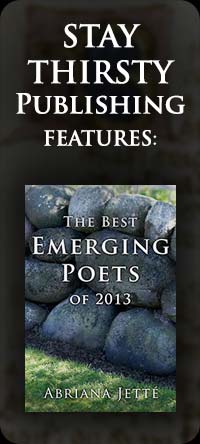

By THIRSTY
Excerpts from Paul Muldoon at "Banter at Other Voices" Hosted by Jim Carroll (Courtesy of and Produced by South Wind Blows)
Paul Muldoon won the Pulitzer Prize in 2003 for his ninth collection of poems entitled Moy Sand and Gravel. Born in Portadown, Co. Armagh, Northern Ireland, he has authored twelve major collections of poetry, in addition to a significant body of other writings, and his poems have been translated into twenty languages. From 1999 to 2004, he was Professor of Poetry at Oxford University and since 1987 has taught at Princeton. He currently is the Howard G.B. Clark '21 chair in Humanities. During his career, he has received many other honors including the American Academy of Arts and Letters Award, the T.S. Eliot Prize, the Irish Times Poetry Prize, the Shakespeare Prize and the European Prize for Poetry. He is also a lyricist for and a member of the Wayside Shrines, a music collective. THIRSTY was privileged to visit with Paul Muldoon this fall in Princeton, New Jersey, for this conversation.
THIRSTY: You favored a quote from Dylan Thomas when you worked at the BBC that began, "In olden days poets ran away to sea…" Where do poets run to today?
PAUL MULDOON: I was referring to the fact that, in that era, many poets ran away to the BBC. Many, like myself and my fellow Irishmen W.R. Rodgers and Louis MacNeice, worked for the British Broadcasting Corporation as radio producers. I guess that BC, in the sense of Boston College, is where they'd be running today. No harm in that, I'd say. The modern university has a significant role in giving patronage to poets as it gives patronage to quantum physicists and philosophers.
THIRSTY: You have published books of poems and of rock lyrics. Poetry and music has a rich history of cross-pollination. What draws you to each as a vehicle of expression?
PAUL MULDOON: I love song as an art form. I was brought up on a rich diet of song in English and Irish, as well as being coeval with the rise of rock n' roll as an art form, and I'm inspired to try to be part of it. I write songs for fun.

MAGGOT by Paul Muldoon (2010)

THE WORD ON THE STREET by Paul Muldoon (2013)
THIRSTY: Your books Maggot: Poems and The Word On The Street: Rock Lyrics were released as ebooks in August and September 2014 respectively. How do you view the ebook revolution?
PAUL MULDOON: I have the Collected Poems of W.B. Yeats on my iPad and I love having immediate access to them. But I have about 10 paper editions of Yeats that I'm not about to let go of. One, in particular, is a mass of notes to myself.
THIRSTY: Growing up in Northern Ireland, witnessing the social and political turmoil of the times as well as the emergence and global influence of the British rock bands of the '60s, how do the memories of your youth inform your current poetry and song lyrics?
PAUL MULDOON: Everything I do is shot through (if that's not too unfortunate a term), with my background in Ireland. I lived in Belfast between 1969 and 1986, so it was certainly a turbulent time. On the other hand, there are turbulent times to be had in every part of the world. Turbulence, rather than tranquility, may be our default mode.
THIRSTY: You have spoken about the importance of the underdog, the underprivileged and the renegade. Do you feel today like an Irishman living the life of an American poet and professor or like an American who celebrates his Irish roots but from a distance?
PAUL MULDOON: I try not to think of myself at all. But if I think of myself as an American, say, I think of being part of a civilization in which genocide, slavery, civil war, illegal incursions and internment without trial are all part of the mix. It might be less burdensome to be Irish.
THIRSTY: You have referred to the influence of W.B. Yeats, John Donne, Gerard Manley Hopkins, Robert Frost and Seamus Heaney on your work and in Heaney's case directly on your life. Do you feel their presence as you create new works of your own?
PAUL MULDOON: I do try to keep the bar as high as possible. It's not that I feel I'm in direct competition with John Donne or Emily Dickinson but I don't see much point in trying to write at all unless one realizes that the predicament in which they found themselves is no different from one's own.
THIRSTY: Your wife, Best-selling novelist Jean Hanff Korelitz, was interviewed by Stay Thirsty in our Summer 2014 issue. She began her writing career as a poet and you have said that she has influence over you and your work. Do you think her input has made you a better poet? How do two highly acclaimed writers succeed at living under the same roof?
PAUL MULDOON: It's easy. I do what she says.
THIRSTY: You have expressed your interest in Zen Buddhism and the emptying of the self and the giving over to the power beyond and within. Is there a force beyond your self that guides your poetry as you craft each word in a poem or in a song lyric? Because of Zen do you feel more able to rise above the challenges that life presents?
PAUL MULDOON: Funnily enough, I've just taken up Kyudo, the Way of the Bow, with which I've always been fascinated. The trick, of course, is to allow Kyudo to take you up. I believe absolutely in humility as the strongest force in art.

Paul Muldoon (credit: van Hattem)
THIRSTY: In the conception of a poem and its actual construction, do you feel yourself to be more like an architect or a structural engineer or more like an artist without any worldly constraints able to explore limitless boundaries?
PAUL MULDOON: I'm both a makar and a troubadour, seeker and stumbler upon, engineer and ingénu.
THIRSTY: We live in a very short attention span world filled with electronic distractions and overly filled personal schedules. How important is getting the reader into a poem right from the start?
PAUL MULDOON: Absolutely vital. But that was true for Virgil, Chaucer, Shakespeare, and Milton.
THIRSTY: If you could spend the day with Bruce Springsteen, Bob Dylan, Willie Nelson, Gerard Manley Hopkins or Robert Frost, who would you chose and why?
PAUL MULDOON: I've spent many days with all of them.
THIRSTY: What three pieces of advice would you give to young, aspiring poets? What about those whose careers have begun to emerge?
PAUL MULDOON: I have one piece of advice which was given to many of us by an Irish poet called John Hewitt. He said, "If you go into the poetry business it's no one's fault but your own."
Link:





